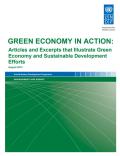Recognising the importance of the financial sector’s incorporation in the transformation process towards green economies, GIZ Financial Systems Development has introduced new advisory services for policymakers and financial intermediaries in the recent past, and has developed specific products and instruments to smooth the way for green growth and suitable climate change adaptation. Current activities focus on the promotion of green financial sector regulation, the build-up of capacities in financial institutions as well as the introduction of innovative financing concepts to increase the flow of funds into green investments, and the development of weather and agricultural insurance solutions.
This paper offers a snapshot of GIZ’s activities. The paper includes case studies from Tajikistan and Ghana.
The process of urbanisation is advancing rapidly. Towns and cities are now responsible for almost four fifths of global GDP; their share in global resource consumption and CO2 emissions is of a similar order. Cities play a leading role in the transformation from consumptive to eco-efficient societies – in short, to a “green economy”. All actors, private and public need to ensure that economic activities contribute to sustainable development. A sustainable economy is not only economically sensible, but also ecologically indispensable. All responsible institutions have to ensure the creation of enabling frameworks for actors in such a way that the “common goods” are protected and that the long-term conditions for living and economic activity are secured.
This report aims to help environmental and other competent authorities in OECD countries to promote green business practices among small and medium-sized enterprises (SMEs). It analyses different ways to establish environmental regulatory requirements for facilities with low environmental risk (most of which are SMEs). It also examines how to design and apply information and market-based tools to promote compliance with such requirements and adoption of cleaner technologies and good environmental management practices. The report suggests several ways to increase the effectiveness of these promotion tools with respect to the SME community.
The report addresses the roles of environmental authorities, local governments, business organisations and financial institutions in the greening of small businesses. It reviews in detail the experience of France, Ireland, Korea, the Netherlands and the UK (England, Wales, and Scotland) and draws on examples of several other countries.

The Green Economy is one in which the vital linkages among the economy, society, and environment are taken into account. This selection of articles and excerpts emerged in response to the need to fill the knowledge gap on practical, concrete, and on the ground green economy country experience. It is in this spirit that the articles and excerpts included in this publication have been selected: to provide information and knowledge for policy and decision makers and practitioners on the positive implications of greening some priority sectors, including job creation, resource efficiency, and generally contribution to sustainable development through an extensive review of scientific publications and magazines.
The sectors analysed are water, agriculture, energy, industry, business, ecosystems, technology, waste management. The report contains several case studies, including from China, Egypt, the United Arab Emirates, the United Kingdom and Europe.
